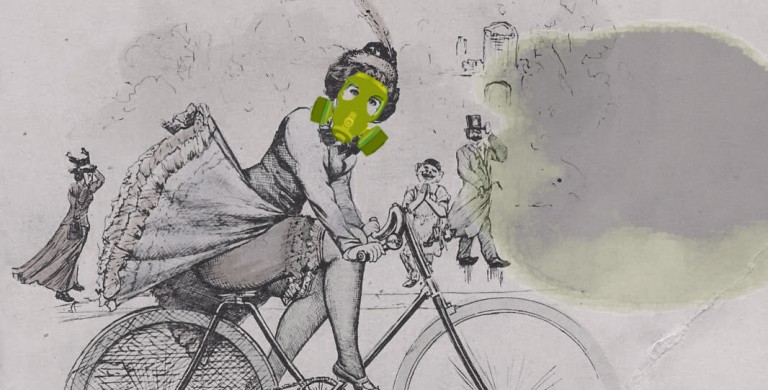On the Plan.Place blog, planner Jenny Koch describes how planners and bicyclists can make it easier to breathe on a bicycle, by reducing the risks posed by traffic-related air pollutants.

Inspired by her bicycle commute between DC and Northern Virginia, planner Jenny Koch explores, on the Plan.Place blog, why and how we should be taking air pollution into account when planning for bicycles. Those who choose to (always or sometimes) ride a bicycle rather than drive know that there can be many benefits for their mental and physical health, time efficiency (no need to look for parking!), and cost savings. But "if we are installing bicycle facilities to encourage healthy behavior and environmentally-sound decision-making, we shouldn’t ignore evidence that certain types of bicycle facilities are better for our health than others. […] People riding bicycles in lanes directly adjacent to vehicles are exposed to higher levels of traffic-related air pollution than those riding on separated lanes or paths. Yet pollution exposure does not directly influence how we plan and design bicycle facilities."
"Drivers are more exposed to airborne pollution than cyclists by a factor of 1.7-3.7, but elevated levels of particulates are of particular concern to people on bicycles because of their increased respiration and absorption rates compared with most other road users. [But just] because we know there are risks associated with riding a bicycle doesn’t mean that we should stop planning for (or riding) bicycles. Air quality and bicycles are already being tied together in many places, as cities recognize that the more that we exchange short automobile trips (which make up the bulk of urban trips) with non-motorized trips, the better our urban air quality and health would be. Now we just have to recognize that the relationship and impacts between bicycles and air quality go both ways."
Koch argues that while it may not be the most important factor in a planning process, "pollution from traffic should [at least] be given ‘factor’ status and be brought into the equation so that it can influence the process when warranted by the conditions." Suggested solutions range from the installation of separated lanes – particularly in heavy-traffic areas, or areas where air quality is already poor – to better outreach and information sharing for people riding bicycles.
FULL STORY: Breathe Easier: Six ways to reduce the impacts of air pollution on people riding bicycles

Planetizen Federal Action Tracker
A weekly monitor of how Trump’s orders and actions are impacting planners and planning in America.

Maui's Vacation Rental Debate Turns Ugly
Verbal attacks, misinformation campaigns and fistfights plague a high-stakes debate to convert thousands of vacation rentals into long-term housing.

Restaurant Patios Were a Pandemic Win — Why Were They so Hard to Keep?
Social distancing requirements and changes in travel patterns prompted cities to pilot new uses for street and sidewalk space. Then it got complicated.

In California Battle of Housing vs. Environment, Housing Just Won
A new state law significantly limits the power of CEQA, an environmental review law that served as a powerful tool for blocking new development.

Boulder Eliminates Parking Minimums Citywide
Officials estimate the cost of building a single underground parking space at up to $100,000.

Orange County, Florida Adopts Largest US “Sprawl Repair” Code
The ‘Orange Code’ seeks to rectify decades of sprawl-inducing, car-oriented development.
Urban Design for Planners 1: Software Tools
This six-course series explores essential urban design concepts using open source software and equips planners with the tools they need to participate fully in the urban design process.
Planning for Universal Design
Learn the tools for implementing Universal Design in planning regulations.
Heyer Gruel & Associates PA
JM Goldson LLC
Custer County Colorado
City of Camden Redevelopment Agency
City of Astoria
Transportation Research & Education Center (TREC) at Portland State University
Jefferson Parish Government
Camden Redevelopment Agency
City of Claremont


























